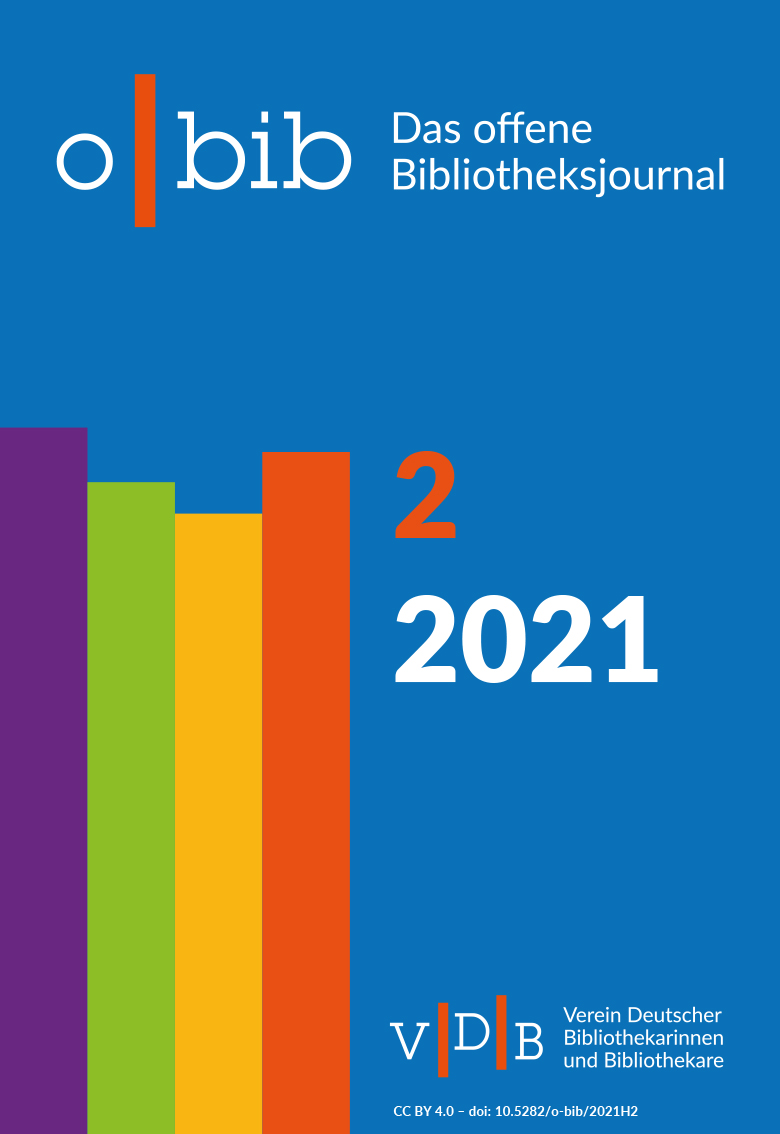Auf dem Weg zu einem integrativen Modell der Informationskompetenzvermittlung (IMIK)
Das ACRL Framework for Information Literacy for Higher Education und der aktivitäts- und eigenschaftsorientierte Datenlebenszyklus
DOI:
https://doi.org/10.5282/o-bib/5666Keywords:
ACRL, Framework for Information Literacy for Higher Education, Aktivitäts- und Eigenschaftsorientierter Datenlebenzyklus, Integratives Modell der Informationskompetenzvermittlung, IMIK, Forschungsdatenmanagement, FDM, Data Literacy, DL, Informationskompetenzvermittlung, IK, InformationskompetenzAbstract
This paper examines the possible contribution of the ACRL Framework for Information Literacy for Higher Education to an integrated model for information and data literacy. For this, the core ideas and principles of the framework are compared to those of an activity and property driven data life cycle that describes the research process in research data management and data literacy. Based on the results of the comparison both concepts are synthesized into an Integrated Model for Information Literacy (IMIL), which is specified and supplemented by the data life cycle model. Applying IMIL, contents for courses in information and data literacy for different target audiences and levels can be developed, structured, differentiated and assigned to different stakeholders from science and infrastructure.
References
Association of College and Research Libraries (ACRL): Framework for Information Literacy for Higher Education, ala.org, 11.01.2016, http://www.ala.org/acrl/sites/ala.org.acrl/files/content/issues/infolit/framework1.pdf, Stand: 04.12.2020.
Klingenberg, Andreas: Referenzrahmen Informationskompetenz. Erarbeitet von Andreas Klingenberg im Auftrag der dbv-Kommission Bibliothek & Schule und der Gemeinsamen Kommission Informationskompetenz von VDB und dbv, bibliotheksverband.de, 2016, https://www.bibliotheksverband.de/fileadmin/user_upload/Kommissionen/Kom_Infokompetenz/2016_11_neu_Referenzrahmen-Informationskompetenz_endg__2__Kbg.pdf, Stand: 04.12.2020.
Deutscher Bibliotheksverband e.V.: Wissenschaftliche Bibliotheken 2025, bibliotheksverband.de, Januar 2018, https://www.bibliotheksverband.de/fileadmin/user_upload/Sektionen/sektion4/Publikationen/WB2025_Endfassung_endg.pdf, Stand: 04.12.2020.
Homann, Benno: Das Dynamische Modell der Informationskompetenz (DYMIK). Didaktisch-methodische Grundlage für die Vermittlung von Methodenkompetenz an der UB Heidelberg, Theke. Informationsblatt der Mitarbeiterinnen und Mitarbeiter im Bibliotheks-system der Universität Heidelberg, 2000, S. 86-93, https://www.ub.uni-heidelberg.de/schulung/schulungskonzept/DYMIK.pdf, Stand: 04.12.2020.
Kuhlthau, Carol: Information Search Process, Rutgers. School of Communication and Information, http://wp.comminfo.rutgers.edu/ckuhlthau/information-search-process/, Stand: 04.12.2020.
Mackey, Thomas P.; Jacobson, Trudi E.: Reframing Information Literacy as a Metaliteracy, in: College and Research Libraries 72 (1), 2011, https://crl.acrl.org/index.php/crl/article/view/16132/17578, Stand: 04.12.2020.
Meyer, Jan; Land, Ray: Threshold Concepts and Troublesome Knowledge. Linkages to Ways of Thinking and Practising within the Disciplines, in: ETL Project Reports, Occassional Report 4, 2003, http://www.etl.tla.ed.ac.uk/docs/ETLreport4.pdf, Stand: 04.12.2020.
Schüller, Katharina; Busch, Paulina; Hindinger, Carina: Future Skills: Ein Framework für Data Literacy, Hochschulforum Digitalisierung Nr. 47, Zenodo, 05.09.2019, https://doi.org/10.5281/zenodo.3349864.
The Big 6, https://thebig6.org/, Stand: 04.12.2020.
Townsend, Lori; Hofer, Amy R.; Hanick, Silvia L.; Brunetti, Korey: Identifying Threshold Concepts for Information Literacy. A Delphi Study, in: Communications in Information Literacy, 10 (1), 2016, S. 23-49, https://doi.org/10.15760/comminfolit.2016.10.1.13.
Treloar, Andrew; Harboe-Ree, Cathrine: Data Management and the Curation Continuum. How the Monash Experience Is Informing Repository Relationships, in: VALA (6), 05.02.2008, https://www.vala.org.au/vala2008-proceedings/vala2008-session-6-treloar, Stand: 04.12.2020.
UK Data Service: Research data lifecycle, ukdataservice.ac.uk, https://www.ukdataservice.ac.uk/manage-data/lifecycle.aspx, Stand: 04.12.2020.
Wolf, Armin Harry; Leppla, Cindy: Harmonisierung von Datenlebenszyklus-Modellen. Nutzung von Synergien für optimierte Anwendungen im FDM, in: Bausteine Forschungsdatenmanagement. Empfehlungen und Erfahrungsberichte für die Praxis von Forschungsdatenmanagerinnen und -managern 2 (November), 2020, S. 1-19, https://doi.org/10.17192/bfdm.2020.2.8281.
Downloads
Published
Issue
Section
License
Copyright (c) 2021 Cindy Leppla, Armin Harry Wolf

This work is licensed under a Creative Commons Attribution 4.0 International License.





